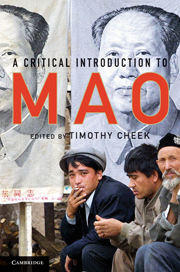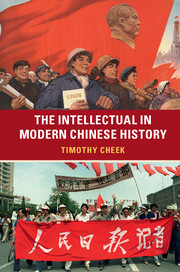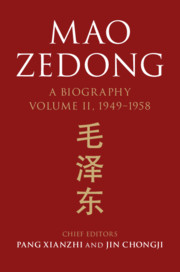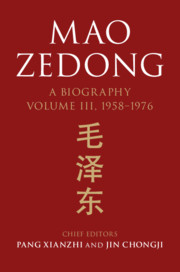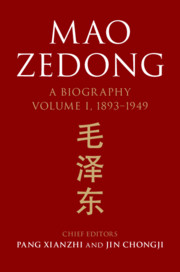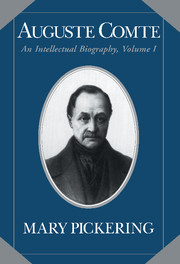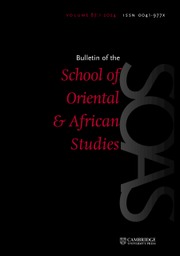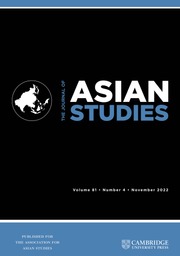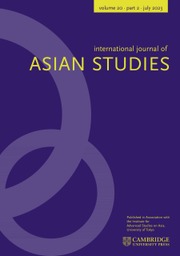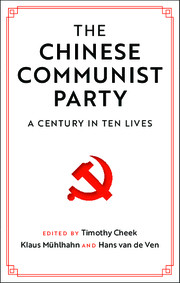A Critical Introduction to Mao
$80.00 (C)
- Editor: Timothy Cheek, University of British Columbia, Vancouver
- Date Published: August 2010
- availability: Available
- format: Hardback
- isbn: 9780521884624
$
80.00
(C)
Hardback
Other available formats:
Paperback, eBook
Looking for an examination copy?
This title is not currently available for examination. However, if you are interested in the title for your course we can consider offering an examination copy. To register your interest please contact [email protected] providing details of the course you are teaching.
-
Mao Zedong’s political career spanned more than half a century. The ideas he championed transformed one of the largest nations on earth and inspired revolutionary movements across the world. Even today Mao lives on in China, where he is regarded by many as a near-mythical figure, and in the West, where a burgeoning literature continues to debate his memory. In this book, leading scholars from different generations and around the world offer a critical evaluation of the life and legacy of China’s most famous – some would say infamous – son. In the first section, chapters explore the historical and political context of Mao’s emergence as a young man and revolutionary in the early twentieth century. Through this period it is possible to examine the nature of Mao’s ideology in its purest form and to see why it was attractive to so many. This section also chronicles the main events of his life and individual aspects of that life: his key relationships with allies and foes, his followers and his public persona, his philosophy, and his relationship with women. In the final part, chapters debate the positive and negative aspects of his legacy; in China Mao has become a metaphor for the promises and betrayals of the twentieth century, in developing countries he remains a beacon of revolutionary hope for some, and in the West Mao continues to be the mirror of our hopes and fears. The book brings the scholarship on Mao up to date, and its alternative perspectives equip readers to assess for themselves the nature of this mercurial figure and his significance in modern Chinese history.
Read more- Engaging and comprehensive introduction for students and non-specialists to one of the most important political figures of the twentieth century
- Notable and influential scholars from across the generations debate and discuss Mao's life, his work and his legacy
- Complete with photographs, a map, a timeline and suggested readings
Reviews & endorsements
"It is important to understand Mao, and this book makes a contribution to such understanding."—Hong Kong Economic Journal
See more reviews"Timothy Cheek’s anthology 'A Critical Introduction to Mao' attest[s] to the difficulty of definitively fixing Mao’s image, a project that amounts to writing a history of China’s present.... The most stimulating chapters in the academic collection... discuss Mao's "Sinification" of a European tradition of revolution."—The New Yorker
"The chapters in Cheek’s collection contribute to an understanding of Mao Zedong that is as messy and complex as it is compelling. The text, moreover, encourages readers to engage the problem of knowing the historical Mao, while reminding the reader of the equal importance of Mao’s ahistorical legacy." - Brian J. DeMare, Tulane University, Twentieth Century China and The China Beat
Customer reviews
17th Oct 2024 by UName-445746
critics consider him a dictator comparable to Adolf Hitler and Joseph Stalin who severely damaged traditional Chinese culture, as well as a perpetrator of systematic human rights abuses who was responsible for an estimated 40 to 70 million deaths through starvation, forced labour and executions, ranking his tenure as the top incidence of democide in human history.
Review was not posted due to profanity
×Product details
- Date Published: August 2010
- format: Hardback
- isbn: 9780521884624
- length: 392 pages
- dimensions: 235 x 158 x 25 mm
- weight: 0.65kg
- contains: 16 b/w illus. 2 maps
- availability: Available
Table of Contents
Part I. Mao's World:
1. Mao, revolution, and memory Timothy Cheek
2. Making revolution in twentieth-century China Joseph Esherick
3. From urban radical to rural revolutionary: Mao from the 1920s to 1937 Brantly Womack
4. War, cosmopolitanism, and authority: Mao from 1937 to 1956 Hans J. van de Ven
5. Consuming fragments of Mao Zedong: the chairman's final two decades at the helm Michael Schoenhals
6. Mao and his followers Frederick C. Teiwes
7. Mao, Mao Zedong thought, and communist intellectuals Hung-yok Ip
8. Gendered Mao: Mao, Maoism, and women Delia Davin
9. Mao the man and Mao the icon Daniel Leese
Part II. Mao's Legacy:
10. For truly great men, look to this age alone: was Mao Zedong a new emperor? Geremie Barme
11. Recent Mao Zedong scholarship in China Xiao Yanzhong
12. Third world Maoism Alexander Cook
13. Mao's journeys to the west: meanings made of Mao Charles W. Hayford
14. Two perspectives on Mao Zedong Jiang Yihua and Roderick MacFarquhar.
Sorry, this resource is locked
Please register or sign in to request access. If you are having problems accessing these resources please email [email protected]
Register Sign in» Proceed
You are now leaving the Cambridge University Press website. Your eBook purchase and download will be completed by our partner www.ebooks.com. Please see the permission section of the www.ebooks.com catalogue page for details of the print & copy limits on our eBooks.
Continue ×Are you sure you want to delete your account?
This cannot be undone.
Thank you for your feedback which will help us improve our service.
If you requested a response, we will make sure to get back to you shortly.
×
